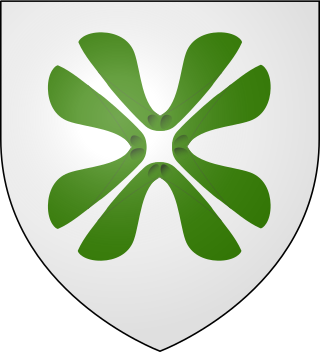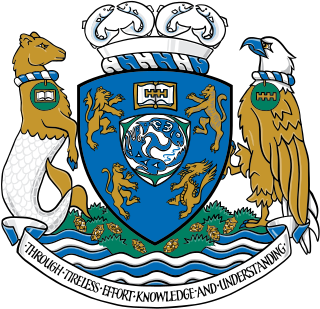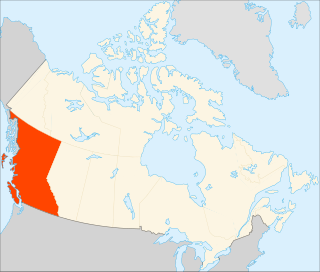Related Research Articles

A podiatrist is a medical professional devoted to the treatment of disorders of the foot, ankle, and related structures of the leg. The term originated in North America but has now become the accepted term in the English-speaking world for all practitioners of podiatric medicine. The word chiropodist was previously used in the United States, but it is now regarded as antiquated.

The Royal College of Physicians and Surgeons of Canada is a regulatory college which acts as a national, nonprofit organization established in 1929 by a special Act of Parliament to oversee the medical education of specialists in Canada.

The University of Winnipeg is a public research university in Winnipeg, Manitoba, Canada. It offers undergraduate programs in art, business, economics, education, science and applied health as well as graduate programs. UWinnipeg's founding colleges were Manitoba College and Wesley College, which merged to form United College in 1938. The University of Winnipeg was established in 1967 when United College received its charter.

Universities Canada is an organization that represents Canada's universities. It is a non-profit national organization that coordinates university policies, guidance and direction.

Student affairs, student support, or student services is the department or division of services and support for student success at institutions of higher education to enhance student growth and development. People who work in this field are known as student affairs educators, student affairs practitioners, or student affairs professionals. These student affairs practitioners work to provide services and support for students and drive student learning outside of the classroom at institutions of higher education.
Residence Life is the comprehensive program that surrounds the experience of living "on and off campus" in a residence hall at a college or university. Residence Life is usually structured with planned events, a code of conduct and ethics, and a relatively large array of staff.

The First Nations University of Canada is a post-secondary institution and federated college of the University of Regina, based in the Canadian province of Saskatchewan. FNUniv operates three campuses within the province, in Prince Albert, Regina, and Saskatoon. The university offers academic programs in business, the humanities, social sciences, and sciences; including a number of programs focused around aboriginal practices.

Kwantlen Polytechnic University (KPU) is a public undergraduate degree-granting polytechnic university in British Columbia, Canada, with campuses in Surrey, Richmond, Cloverdale, Whalley, and Langley. KPU is one of the largest institutions by enrolment in British Columbia garnering a total of 20,000 students and 1,400 faculty members across its five locations, encompassing the Metro Vancouver district. KPU provides undergraduate and vocational education including bachelor's degrees, associate degrees, diplomas, certificates, apprenticeships, and citations in more than 140 diverse programs.

A paramedic is a healthcare professional, providing pre-hospital assessment and medical care to people with acute illnesses or injuries. In Canada, the title paramedic generally refers to those who work on land ambulances or air ambulances providing paramedic services. Paramedics are increasingly being utilized in hospitals, emergency rooms, clinics and community health care services by providing care in collaboration with registered nurses, registered/licensed practical nurses and registered respiratory therapists.
The Master of Health Administration, Master of Healthcare Administration (MHA), or Master of Health Management (MHM), is a master's-level professional degree granted to students who complete a course of study in the knowledge and competencies needed for careers in health administration, involving the management of hospitals and other health services organizations, as well as public health infrastructure and consulting. Programs can differ according to setting; although practitioner-teacher model programs are typically found in colleges of medicine, health professions, or allied health, classroom-based programs can be found in colleges of business or public health.
In the higher education setting, the process of health promotion is applied within a post-secondary academic environments to increase health and wellbeing. The process needs professionals to engage in all five WHO Ottawa Charter Health Promotion Actions and particularly reorient all the sectors of a college campus towards evidence-based prevention, utilizing a public health/population health /community health model. Health promotion requires a coordinated effort in all five Actions:
- Building healthy public policy
- Creating supportive environments
- Strengthening community action
- Developing personal skills
- Re-orienting all service sectors toward prevention of illness and promotion of health

College health is a desired outcome created by a constellation of services, programs and policies directed at advancing the health and wellbeing of individuals enrolled in an institution of higher education, while also addressing and improving both population health and community health. Many colleges and universities worldwide apply both health promotion and health care as processes to achieve key performance indicators in college health. The variety of healthcare services provided by any one institution range from first aid stations employing a single nurse to large, accredited, multi-specialty ambulatory healthcare clinics with hundreds of employees. These services, programs and policies require a multidisciplinary team, the healthcare services alone include physicians, physician assistants, administrators, nurses, nurse practitioners, mental health professionals, health educators, athletic trainers, dietitians and nutritionists, and pharmacists. Some of the healthcare services extend to include massage therapists and other holistic health care professionals. While currently changing, the vast majority of college health services are set up as cost centers or service units rather than as parts of academic departments or health care delivery enterprises.
American College Personnel Association - College Student Educators International is a major student affairs association headquartered in Washington, D.C. at the National Center for Higher Education.

The NASPA, Student Affairs Administrators in Higher Education is a U.S.-based student affairs organization with over 13,000 members at 1,400 campuses in 25 countries. Founded in 1919 at the University of Wisconsin, NASPA focuses on professionals working within the field of student affairs.
Arthur Wright Chickering was an American educational researcher in the field of student affairs. He was known for his contribution to student development theories. In 1990 he was appointed Dean of the Graduate School of Education at George Mason University. He was succeeded in 1992 by Dr. Gustavo A. Mellander. Chickering also taught at George Mason University and Goddard College. He worked at Goddard College as a Special Assistant to Presidents Schulman and Vacarr from 2002 to 2012. Chickering died on August 15, 2020, in East Montpelier, VT.

Higher education in New Brunswick refers to education provided by higher education institutions in the Canadian province of New Brunswick. Higher education has a rich history in New Brunswick. The first English-language university in Canada was the University of New Brunswick. Mount Allison University was the first in the British Empire to award a baccalaureate to a woman, Grace Annie Lockhart, B.Sc. in 1875. Education is the responsibility of the provinces in Canada and there is no federal ministry governing it.

Higher education in British Columbia is delivered by 25 publicly funded institutions that are composed of eleven universities, eleven colleges, and three institutes. This is in addition to three private universities, five private colleges, and six theological colleges. There are also an extensive number of private career institutes and colleges. Over 297,000 students were enrolled in post-secondary institutions in British Columbia in the 2019-2020 academic year.

Nurses in Canada practise in a wide variety of settings, with various levels of training and experience. They provide evidence-based care and educate their patients about health and disease.

The Joint Commission of Pharmacy Practitioners (JCPP) is the largest professional delegation representing the interests of pharmacists within the United States. JCPP represents 13 professional associations in the field of pharmacy, developing consensus policy directives for the profession. It is well known for the 2014 development of "The Pharmacists’ Patient Care Process," which provides broad, consensus guidelines for how clinical pharmacists should practice.
References
- ↑ "Student Affairs Associations". Academic360.com. Retrieved July 14, 2009.
- ↑ "Professional Associations". StudentAffairs.com. Archived from the original on June 29, 2009. Retrieved July 14, 2009.
- ↑ "About CACUSS". Canadian Association of College & University Student Services. Archived from the original on July 6, 2011. Retrieved April 27, 2009.
- ↑ "Communiqué". www.cacuss.ca. Retrieved 2020-02-02.
- ↑ "Achieving Student Success: Transitions to Post-secondary Education Webcast". 2010. doi:10.1037/e530462012-001.
{{cite journal}}: Cite journal requires|journal=(help) - ↑ "Submitting to Communiqué". www.cacuss.ca. Retrieved 2020-02-02.
- ↑ "Health Data". www.cacuss.ca. Retrieved 2020-02-02.
- ↑ "About NCHA". www.acha.org. Retrieved 2020-03-03.
- ↑ "Publications and Reports". www.acha.org. Retrieved 2020-03-03.
- ↑ "NCHA Home". www.acha.org. Retrieved 2020-02-02.
- ↑ "Job Board". www.cacuss.ca. Retrieved 2020-02-02.
- ↑ "Graduate/Certificate Programs". www.cacuss.ca. Retrieved 2020-02-02.
- 1 2 3 4 "CACUSS Student Affairs and Services Competency Model" (PDF).[ dead link ]
- ↑ "ACPA/NASPA Professional Competency Rubrics" (PDF).
- ↑ "Publications and Webinars". www.cacuss.ca. Retrieved 2020-02-02.
- ↑ "Conference". www.cacuss.ca. Retrieved 2020-03-04.
- ↑ "Associate Members of AUCC". Association of Universities and Colleges of Canada. Archived from the original on July 27, 2009. Retrieved July 14, 2009.
- ↑ "Members of CAS". Council for the Advancement of Standards in Higher Education. Archived from the original on June 13, 2010. Retrieved July 14, 2009.